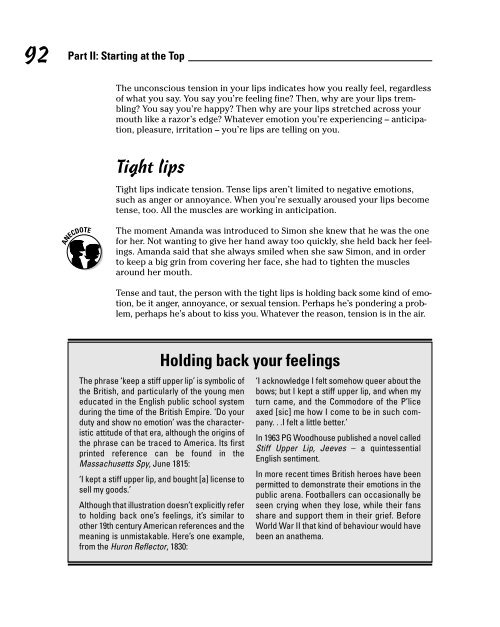Reading Body Language
Reading Body Language
Reading Body Language
Create successful ePaper yourself
Turn your PDF publications into a flip-book with our unique Google optimized e-Paper software.
92<br />
Part II: Starting at the Top<br />
The unconscious tension in your lips indicates how you really feel, regardless<br />
of what you say. You say you’re feeling fine? Then, why are your lips trembling?<br />
You say you’re happy? Then why are your lips stretched across your<br />
mouth like a razor’s edge? Whatever emotion you’re experiencing – anticipation,<br />
pleasure, irritation – you’re lips are telling on you.<br />
Tight lips<br />
Tight lips indicate tension. Tense lips aren’t limited to negative emotions,<br />
such as anger or annoyance. When you’re sexually aroused your lips become<br />
tense, too. All the muscles are working in anticipation.<br />
The moment Amanda was introduced to Simon she knew that he was the one<br />
for her. Not wanting to give her hand away too quickly, she held back her feelings.<br />
Amanda said that she always smiled when she saw Simon, and in order<br />
to keep a big grin from covering her face, she had to tighten the muscles<br />
around her mouth.<br />
Tense and taut, the person with the tight lips is holding back some kind of emotion,<br />
be it anger, annoyance, or sexual tension. Perhaps he’s pondering a problem,<br />
perhaps he’s about to kiss you. Whatever the reason, tension is in the air.<br />
Holding back your feelings<br />
The phrase ‘keep a stiff upper lip’ is symbolic of<br />
the British, and particularly of the young men<br />
educated in the English public school system<br />
during the time of the British Empire. ‘Do your<br />
duty and show no emotion’ was the characteristic<br />
attitude of that era, although the origins of<br />
the phrase can be traced to America. Its first<br />
printed reference can be found in the<br />
Massachusetts Spy, June 1815:<br />
‘I kept a stiff upper lip, and bought [a] license to<br />
sell my goods.’<br />
Although that illustration doesn’t explicitly refer<br />
to holding back one’s feelings, it’s similar to<br />
other 19th century American references and the<br />
meaning is unmistakable. Here’s one example,<br />
from the Huron Reflector, 1830:<br />
‘I acknowledge I felt somehow queer about the<br />
bows; but I kept a stiff upper lip, and when my<br />
turn came, and the Commodore of the P’lice<br />
axed [sic] me how I come to be in such company.<br />
. .I felt a little better.’<br />
In 1963 PG Woodhouse published a novel called<br />
Stiff Upper Lip, Jeeves – a quintessential<br />
English sentiment.<br />
In more recent times British heroes have been<br />
permitted to demonstrate their emotions in the<br />
public arena. Footballers can occasionally be<br />
seen crying when they lose, while their fans<br />
share and support them in their grief. Before<br />
World War II that kind of behaviour would have<br />
been an anathema.


